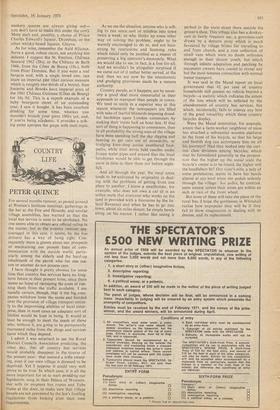PETER QUINCE
For several months rumour, as passed around at Women's Institute meetings, gatherings in the bar at the Fox and Hounds, and similar village assemblies, has warned us that the local bus service is soon to be abolished. No one seems able to obtain any official ruling in the matter, but in the country rumour (en- couraged in this case, it seems, by the bus drivers) has a way of being right. Con- sequently there is gloom about our prospects of maintaining our present lines of com- munication with the outside world, partic- ularly among the elderly and the hard-up inhabitants of the parish who for one rea- son or another do not possess cars.
I have thought it pretty obvious for some time that country bus services have no long- term future in their present form, since there seems no hope of recouping the costs of run- ning them from the traffic available. I am equally certain, though, that if the big com- panies withdrew from the scene and handed over the provision of village transport entire- ly to the improvising abilities of local enter- prise, then in most cases an adequate sort of lifeline would be kept in being. It would at least be enough to meet the needs of those who, without it, are going to he permanently marooned miles from the shops and services upon which they depend.
I admit 1 was surprised to see the Rural District Councils Association predicting, the other day, that all country bus services would probably disappear in the 'course of the present year: that seemed a trifle sweep- ing, even if our own village is doomed to be deprived. Yet I suppose it could very well prove to be true. In which case, it is all the more important for us to start prodding our legislators, snug in their Palace of Westmin- ster with its umpteen bus routes and Tube trains at the door, to make sure that village people are not prevented by the law's footling regulations from looking atter their own requirements. As we see the situation, anyone who is will- ing to run some sort of minibus into town twice a week, or who thinks up some other way of solving the problem, ought to be warmly encouraged to do so, and not ham- strung by restrictions and licensing rules which could only be justified as a means of preserving a big operator's-monopoly. What we would like to see, in fact, is a free-for-all. And we wouldn't be altogether surprised if we came out of it rather better served, at the end, than we are now by the uneconomic and grudging provisions made by a remote authority.
Country people, as it happens, are by neces- sity a good deal more resourceful in their approach to transport than people in towns. We tend to smile in a superior way at this season whenever the newspapers are filled with tales of fearful blizzards imposing dread- ful hardships upon London commuters by making their trains half an hour late. If that sort of thing is happening to commuters, then in all probability the strong men of the village have been spending half the day digging and heaving to get cars out of snowdrifts, or trudging knee-deep across smothered foot-, paths, while their wives held candles under frozen water-pipes and prayed that the local handyman would be able to get through the snow in time to thaw them out before night- fall.
And all through the year, the rural scene tends to be' enlivened by originality in deal- ing with the problems of getting from one place to another. I know a smallholder, for example, who does not own a car (it is an urban myth that everyone who works on the land is provided with a limousine by the In- land Revenue) and when he has to go into town, about six miles distant, he simply bowls along on his tractor. I rather like seeing it
parked in the main street there outside the grocer's shop. This village also has a donkey- cart in fairly frequent use, a governess-cart drawn by a demure pony which is much favoured by village brides for travelling to and from church, and a rum collection of small vans which were no doubt orthodox enough in their distant youth, but which through infinite adaptation and patching by successive owners have ceased to reveal any but the most tenuous connection with normal motor transport.
It was said in the Maud report on local government that 42 per cent of country households still possess no vehicle beyond a bicycle—a statistic which indicates the extent of the loss which will be inflicted by the abandonment of country bus services, but which, incidentally, fails to convey any hint of the great versatility which those country bicycles display.
Were the Maud committee, for example, aware that a farm-worker neighbour of mine has attached a substantial wooden platform to the front of his bicycle, so that his large and foolish dog can accompany him on all his journeys? Had they looked into the curi- ous class divisions among bicycles, which may be formulated generally in the proposi- tion that the higher up the social scale the bicycle's owner is to be found, the higher will the handlebars be? Our vicar's wife, a lady of some pretensions, seems to have her hands almost at eye-level when she pedals sedately through the village: hoi polio!, by contrast, seem uneasy unless their noses are within an inch or two of the front wheel.
But none of these will take the place of the rural bus. J hope the gentlemen in Whitehall realise how unpopular they will be if they fail to show imagination in dealing with its demise, and its replacement.










































 Previous page
Previous page